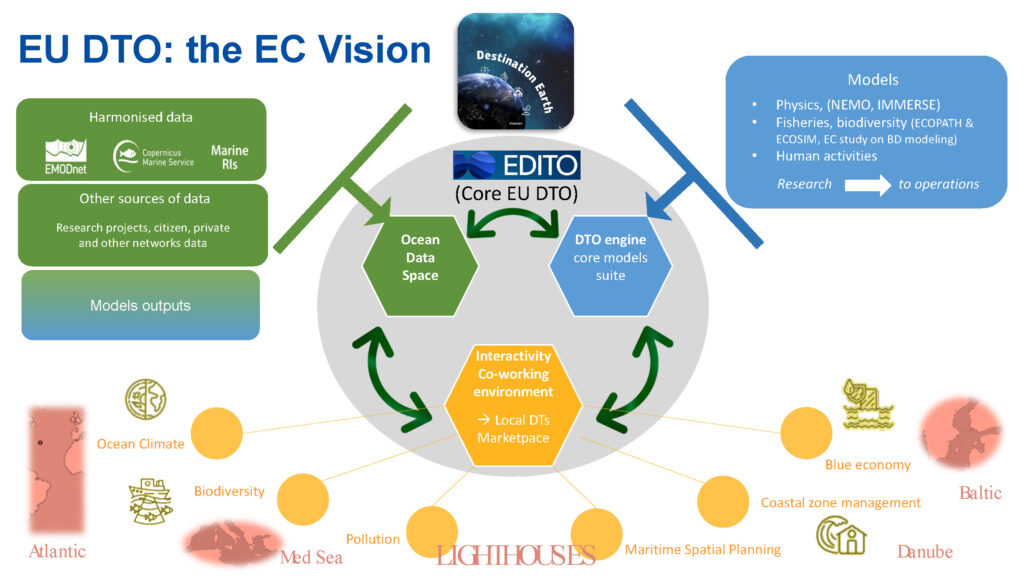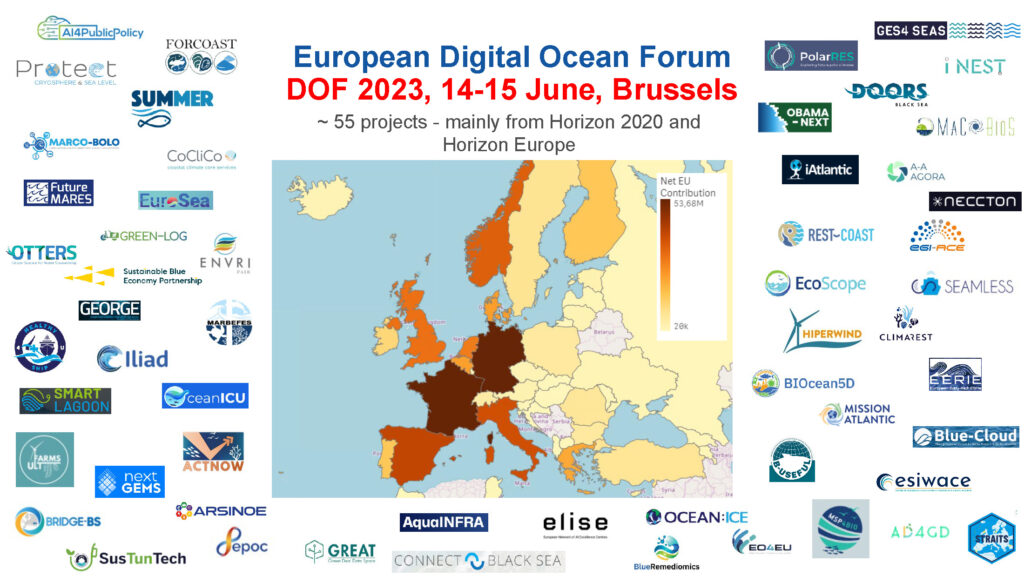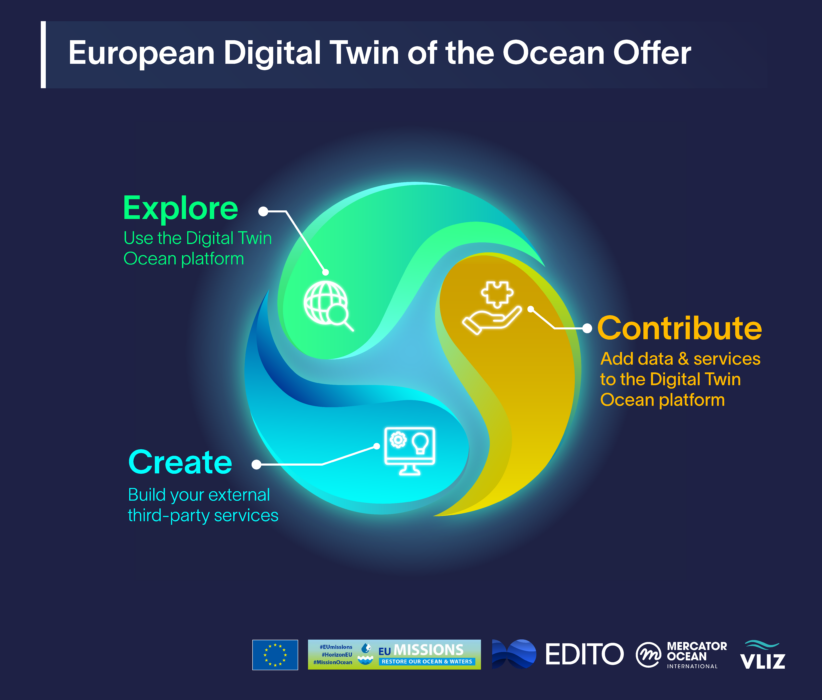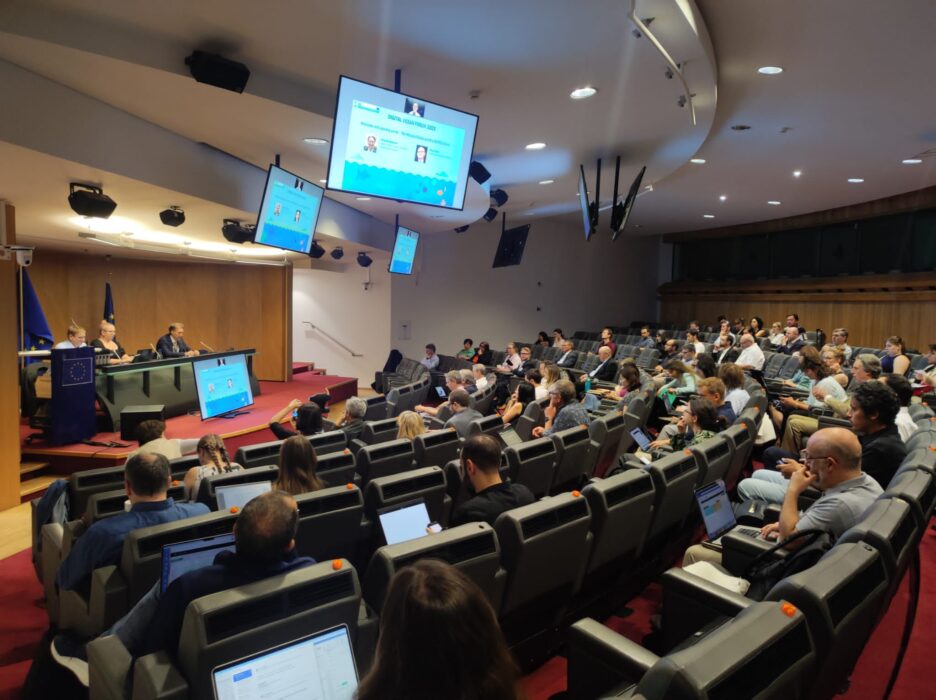On 14 and 15 June 2023, the European Commission hosted the Digital Ocean Forum 2023 with support from Mercator Ocean International and the Flanders Marine Institute (VLIZ) – the two main partners leading the development of the core infrastructure of the European Digital Twin of the Ocean (EU DTO).
This second annual edition of the Digital Ocean Forum brought together more than 200 experts, stakeholders, researchers, policymakers and interested citizens to discuss progress and shape the future of the EU DTO.
The EU DTO is a big project, but the challenges and the imperatives we are trying to address with it are even bigger. It comes down to the Ocean, which is still an enigma to many of us, but one thing we do know for sure, is that the state of the Ocean and the state of our seas and waters isn’t good, and the more we look into that the more worrisome it becomes [….] Our Ocean is still a mystery to us, regardless of so much research is going on and increasing, we keep discovering new things, new species, effects of climate change, effects of human activities on the Ocean, our waters, and marine ecosystems, and we are still not really sure where these effects are leading to. This is why we have embarked on many projects such as the EU Mission Restore our Oceans and Waters, which includes building a knowledgebase in a new and different way to enable us to take action, and this is how EU DTO has become the key element of this Mission.” Deputy Director General Kestutis Sadauskas Directorate-General “Maritime Affairs and Fisheries” (DG MARE)
Preceding the main event, on 14 June, a workshop took place gathering around 60 experts from over 50 different EU funded research and innovation projects to share their views on the development of the EU DTO, the services that it should provide, and how they could contribute to it.


The main event took place on 15 June presenting the outcomes of the workshop and delved into the vision of different stakeholders of the DTO. The DTO will be built through co-design and co-creation federating the EU community, ensuring the DTO’s interoperability with other programmes such as Destination Earth (DestinE) and ensuring the co-development of regional, local and application specific digital twins. In the second session, speakers explored opportunities for the EU DTO to be a game changer and to be valuable to as many different stakeholders as possible, unpacking different questions. How could it address challenges such as current and future impacts of human activities, climate change and biodiversity loss on marine and coastal environments? How could the DTO aid policy and decision-making towards a more sustainable blue economy in sectors such as fisheries, aquaculture, and offshore renewables? Which ethical and societal considerations should be considered to ensure to build trust, transparency, inclusiveness, and convince people that the DTO is there to improve our interactions with the Ocean, not just in the economic sense but to actually improve people’s lives and at the same time protect marine environments?
A DTO offer based on co-creation and to the service of ocean actors

Alain Arnaud, Digital Ocean Director at Mercator Ocean International (MOi), presented the EU DTO’s building blocks and ambitious potential offer. The construction of the DTO is well underway, with its digital architecture – data lake and processing engine being developed through the EDITO-Infra research project headed by MOi and VLIZ. Leveraging on the Copernicus Marine Service and EMODnet as well as European High-Performance Computing and cloud services, EDITO-Infra will federate and connect all European Ocean observing, monitoring and data assets. In parallel, this endeavour is supported by several other projects such as EDITO-Model Lab (developing the DTO model suite & simulation environment and tools), Iliad (DTO pilot applications), Mission Lighthouses (European seas applications), and many others. In a nutshell, EDITO-infra will create a digital dynamic ecosystem facilitating further development of the EU DTO, hosting the deployment of multiple sectoral and local digital twin applications.
The DTO offer is threefold. The basic service will allow users to explore the data in time and in space, from the coast to the open Ocean, from Ocean physics, biology, chemistry to sea ice, ecology and biodiversity, from the surface to the seabed. The second will be to create something with the data and tools available such as predict and assess the impact of climate scenarios, human activities, to inform decisions on different topics from ship routing, establishing Marine Protected Areas (MPAs) to reducing marine pollution strategies. And the third possibility is to be part of the co-creation and evolution of the DTO by bringing in and integrating your own data, tools and services on the platform.
Although the DTO will propel scientific understanding of the Ocean, the aim is that by bringing together multiple sources of data, models and other tools into an open and accessible platform, the DTO will also be useful to “the larger society, policymakers, and the actors in the blue economy and citizens all over the world. “
It is not just about data and ecology and systems and models…; it’s actually understanding that we are a part of this planetary consciousness. We need to have knowledge and we need to have knowledge organised and validated and trusted and harnessed and applied and tested and piloted in ways that suddenly people understand the connection [with the Ocean], they understand why we need to understand more about the Ocean and how that knowledge can help us both to deal with what are learning about the Ocean and actually to make a better future. Science must give hope to people, it must give confidence to policymakers, it must give space to innovation and it must give respite to nature.” – John Bell, European Commission’s ‘Healthy Planet” Director, Directorate-General for Research and Innovation (DG RTD)
Next steps
The European Commission is strongly committed to building the core infrastructure and have the prototype ready by 2024 and Mercator Ocean International is working hard together with partners to achieve this vision. Once the DTO core platform is built and deployed, it will be first open to beta users from different European related projects (EDITO Model Lab, Iliad, Blue Cloud 2026, Mission Lighthouses, among others), then progressively opened to other targeted projects before it is accessible to all.
The next Digital Ocean Forum will take place in June 2024 and promises to show significant advances in the DTO core platform, including a demonstrator to give a concrete example of a real-life application.
Useful Links:
- European Digital Twin of the Ocean: https://research-and-innovation.ec.europa.eu/funding/funding-opportunities/funding-programmes-and-open-calls/horizon-europe/eu-missions-horizon-europe/restore-our-ocean-and-waters/european-digital-twin-ocean-european-dto_en
- Digital Ocean Forum 2023: co-designing and co-developing the European Digital Twin of the Ocean – https://research-and-innovation.ec.europa.eu/news/all-research-and-innovation-news/digital-ocean-forum-2023-co-designing-and-co-developing-european-digital-twin-ocean-2023-06-16_en
- Digital Ocean Forum 2022 report: https://www.mercator-ocean.eu/wp-content/uploads/2022/05/Digital-Ocean-Forum_Highlights-2022.04.20.pdf
- Mercator Ocean International and the Digital Twin Ocean: https://www.mercator-ocean.eu/en/digital-twin-ocean/
- Digital Twin Ocean in 10 points: https://digitaltwinocean.mercator-ocean.eu/
- EDITO-Infra (EU Public Infrastructure for the European DIgital Twin Ocean) https://edito-infra.eu/
- EDITO-Model Lab (Underlying models for the European DIgital Twin Ocean) https://edito-modellab.eu/

